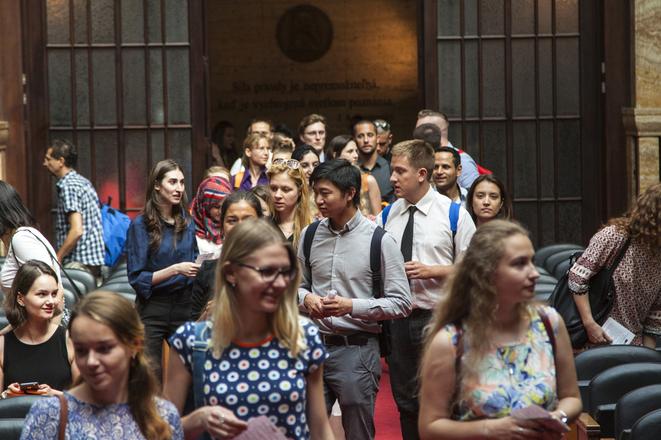Most foreigners tend to say Slovak is a difficult language to learn. Yet many still want to try – including those currently taking part in the longest running Slovak language summer school.
Studia Academica Slovaca (SAS) summer school is taking place for the 52th time this year, which makes it the oldest academic event that offers courses in Slovak language and culture to foreigners. The current edition started July 31. The summer school, taking place under the auspices of the Comenius University in Bratislava, teaches Slovak language but also opens Slovak culture and customs for the foreigners.
“The course helps me a lot,” said Ayman Saad, a translator from Egypt who takes part in the ongoing edition of the school. “We learn a lot about the language and culture and we get into the atmosphere of the language.”
“In comparison to other courses of Slovak language, SAS covers also methodology for foreign teachers of Slovak language, as well as lecturers at foreign universities, delegated by the ministry of education,” said Jana Pekarovičová, the director of SAS.
The oldest summer school
Faculty of Philosophy at the Comenius University offered the first Slovak language courses in 1965. In the 1990s the concept changed into offering Slovak as a foreign language. The educational program “Slovak as a Foreign Language” was recognised by the European Commission and was granted the European label for languages in 2007.
The courses are aimed at foreigners who need Slovak language for professional and academic purposes but also Slovak translators, lecturers and teachers, who want to broaden their knowledge. The core idea is further education of people who are interested in Slovak language and culture, as well as promoting Slovak culture and pursuing opportunities for academic cooperation.
Since its beginning in 1965, the courses produced more than 6,000 graduates, most of them coming from the neighbouring countries like Hungary, Poland, and also Germany.
This year, there are 157 people enrolled from 33 countries, according to Pekarovičová.
“They are usually students of Slovak studies, who obtained a scholarship from the Slovak Ministry of Education,” Pekarovičová said and noted that there has been a growing interest among translation students from the University of Bologna.
Students at all levels
Elisabeth Dörrer, a translator and interpreter from Belgium, is attending the course for the fourth time.
“As a self-learner of Slovak I got myself to a level where I can simultaneously interpret from Slovak into German,” she said. “The SAS summer course is a yearly highlight, both a reward for hard work on my own as well as an opportunity to make new friends and renew old friendships.”
Education at SAS is provided by university staff and lecturers. Many of them have experiences from abroad. This year the summer school offers 14 courses, including practical courses of Slovak language for beginners (A1, A2), intermediate (B1, B2) and advanced students (C1,); and also specific courses on linguistic and literary interpretation of texts, translation or methodology of teaching Slovak language. Teaching takes place at the Faculty of Philosophy at Comenius University.
“Methodological courses for teachers of Slovak language and lecturers sent by ministry to universities abroad are one of the added values of the courses,” added Pekarovičová.
"I decided to enrol in the course because I wanted to translate books from Slovak," said Ayman Saad from Egypt who previously tried to study some Slovak by self-study as he had already completed a degree in English and Czech.
"There is no Slovak course in Egypt, at least I do not know about any, so the best option was to come here," he said.
The scholarship from the Slovak government covered his course fee and accommodation, so he only had to buy his flight ticket to get to Slovakia.
Experience the culture
There are many Slovaks living abroad who come to SAS to learn the language of their forefathers. Others come just to spend holiday in an international community and experience different culture. Participants can choose accommodation option not far from the Faculty of Philosophy, where the courses take place.
“Apart from complete room and board, there are several musical, theatre and cinema events, wonderful receptions with food, impressive opening and closing ceremonies, interesting visits and field trips and even a three-day sightseeing tour through Slovakia, where we all get to choose from four different trips,” Dörrer said.
"We will go to the Tatra mountains, which I like, or the Devín castle," added Ayman. "You visit cities and places that tell you a lot about Slovak culture."
The novelty of the recent few editions are creative workshops, interactive sessions lead usually by young artists, Pekarovičová specified.
“Creative workshops met with high demand and there is also growing interest among professional translators and interpreters,” she said.
Participants can also choose tours that introduce them to the natural and cultural heritage of the Slovak countryside.
Other courses on offer
The Ministry of Education also offers Slovak language courses for foreigners in cooperation via SAS program. The SAS also obtained €291,000 from the state.
By now, 880 foreigners benefited from the course options. Further 437 foreigners studied at courses offered by the Centre for Further Education at the Comenius University in Bratislava (CĎV UK) and language education is also one of the activities of the local branch of the International Organization for Migration (IOM). They also offer courses on social and cultural orientation, with basic facts about Slovakia, getting around in the city, history, gastronomy and traditions.
"Everyday I spend in this school I learn something new as Slovak language isn't easy and needs some effort," says Ayman, who would use the opportunity and come back next year, too.


 Students of Studia Academica Slovaca arrive to the ceremonial opening of the 52nd edition of the summer school. (source: TASR)
Students of Studia Academica Slovaca arrive to the ceremonial opening of the 52nd edition of the summer school. (source: TASR)